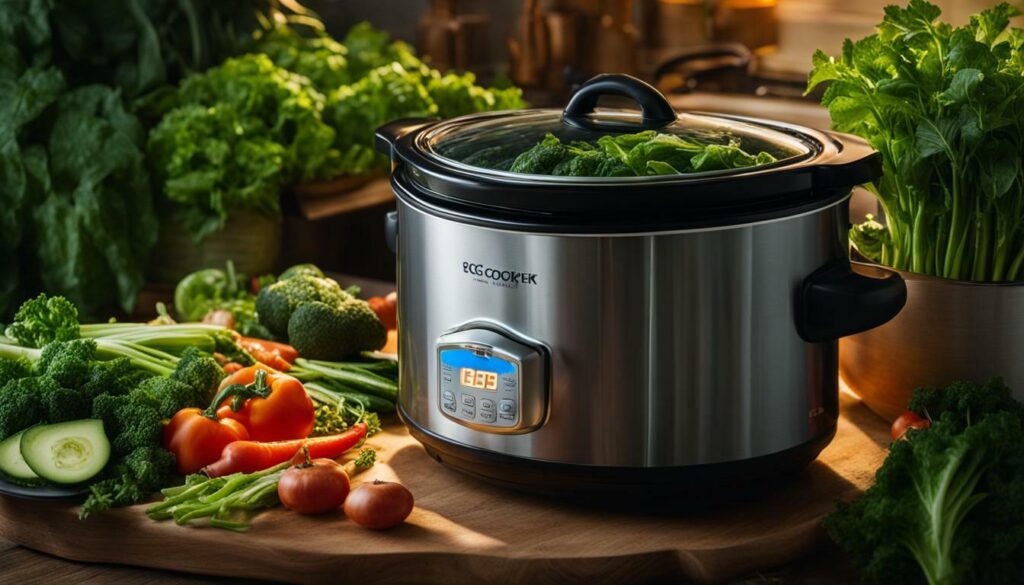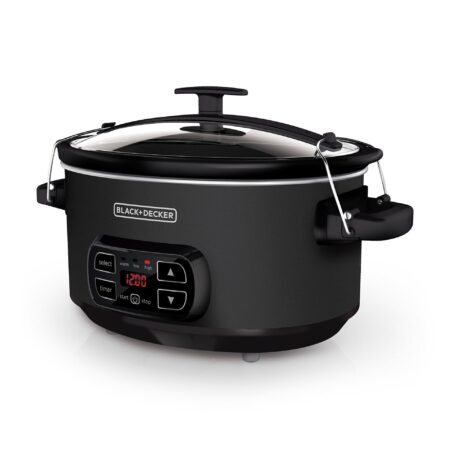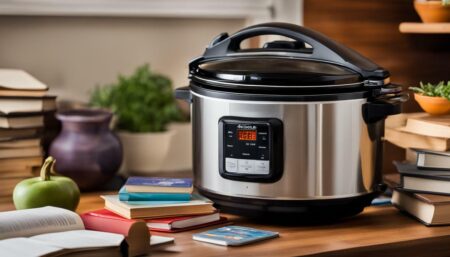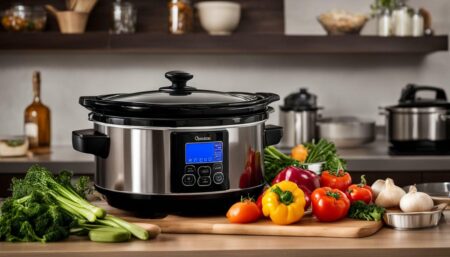If you’re looking for a way to save energy and reduce your energy bills, investing in an energy-efficient slow cooker is a great place to start. Not only do slow cookers use less energy than traditional cooking methods, but they also offer the convenience of hands-free, set-it-and-forget-it meal preparation.
Slow cooker energy efficiency is determined not only by the appliance’s design but also by how you use it. By implementing certain cooking strategies and ingredient preparation techniques, you can further reduce energy consumption and promote sustainable cooking practices.
Key Takeaways
- Slow cookers are an energy-efficient alternative to traditional cooking methods.
- Choosing an energy-efficient slow cooker and using proper cooking strategies can help you save on energy bills.
- Sustainable cooking practices are important for reducing overall energy consumption in the kitchen.
- Slow cookers offer hands-free, convenient meal preparation.
- Slow cookers come in various sizes, and choosing the right size for your needs can impact energy consumption.
Understanding Energy Efficiency Ratings
If you’re in the market for a new slow cooker, it’s important to consider its energy efficiency rating. Energy-efficient slow cookers can help you save on your energy bills while also reducing your overall energy consumption. But what exactly do we mean by energy efficiency rating?
Energy efficiency rating is a measure of how much energy a slow cooker uses to perform its function. It’s usually expressed in terms of the slow cooker’s wattage or power consumption. The lower the wattage, the more energy-efficient the slow cooker is. By choosing a slow cooker with a higher energy efficiency rating, you can reduce your energy consumption and save on your energy bills.
But it’s not just about the slow cooker’s rating. Energy-saving cooking methods can also help reduce your energy consumption. Using a slow cooker is already a great way to save energy, but there are additional tips and tricks you can use to further reduce your energy usage. For example, preparing your ingredients ahead of time and using properly-sized appliances can also help in reducing energy consumption with slow cookers.
Energy-efficient slow cookers can help you save on your energy bills while also reducing your overall energy consumption.
Features to Look for in Energy-Efficient Slow Cookers
If you are considering purchasing an energy-efficient slow cooker, there are several key features to look for to ensure maximum efficiency and sustainability.
First and foremost, consider the size of the slow cooker. Choose a model that is appropriately sized for your needs, as a larger slow cooker will consume more energy to heat up and maintain temperature than a smaller one.
Next, look for eco-friendly slow cookers made with sustainable materials and manufacturing processes. These models often have energy-saving features like improved insulation and programmable settings that can further reduce energy consumption.
Additionally, opt for energy-efficient cooking appliances with high energy star ratings. These appliances meet strict energy efficiency guidelines set by the U.S. Environmental Protection Agency, ensuring that they use less energy and contribute to a greener lifestyle.
Finally, consider purchasing slow cookers with removable, dishwasher-safe components, which make cleaning and maintenance easy and convenient. This can also extend the lifespan of the appliance, reducing the need for frequent replacements and ultimately reducing waste.
By prioritizing these features, you can choose an energy-efficient slow cooker that meets your needs and promotes sustainable cooking practices.
Tips for Maximizing Energy Efficiency
If you’re looking to save energy with slow cookers, there are a few tips and tricks you can use to maximize energy efficiency. By reducing energy consumption with slow cookers, you’ll not only save money on your energy bills but also contribute to a greener lifestyle.
Cooking Strategies
One of the simplest ways to save energy with slow cookers is to use cooking strategies that require the least amount of energy. For example, try to cook meals in low-heat settings whenever possible. This not only saves energy but also helps to preserve the nutrients in your food.
Another strategy is to use the residual heat from the slow cooker to continue cooking your food after you turn it off. For example, if your recipe calls for 8 hours of cooking time, you can turn off your slow cooker after 6 hours and let the residual heat finish the cooking process.
Ingredient Preparation
Proper ingredient preparation can also help you save energy with slow cookers. Avoid opening the lid frequently during the cooking process, as this releases heat and extends cooking time. Also, try to cut your ingredients into smaller pieces to reduce cooking time and energy consumption.
Other Factors
Other factors that can impact energy efficiency include the placement of your slow cooker and the appropriate size for your needs. Place your slow cooker in a cool, dry place away from other heat sources to prevent unnecessary heat buildup. Choosing the appropriate size for your needs can also help reduce energy consumption, as a larger slow cooker requires more energy to heat up and maintain a consistent temperature.
By following these tips and incorporating energy-saving cooking methods into your meal preparation, you can save energy with slow cookers and contribute to sustainable cooking practices.
Comparing Slow Cookers vs. Traditional Cooking Methods
Slow cookers are becoming increasingly popular as a convenient and energy-efficient way to prepare meals. But how do they compare to traditional cooking methods in terms of energy consumption? Let’s take a closer look.
When it comes to energy-saving cooking methods, slow cookers are a clear winner. They use a fraction of the energy required for traditional ovens and stovetops, and their low and slow cooking method means that food is cooked evenly without excessive energy usage.
This energy efficiency also translates to improved meal preparation. Slow cookers allow you to cook larger quantities of food at once, which can save time and energy spent on cooking multiple meals throughout the week. Plus, their versatility means that you can cook a wide variety of dishes using minimal energy.
Another advantage of slow cookers is their convenience. Once the ingredients are added to the pot, the slow cooker does the rest of the work, allowing you to go about your day without worrying about stove and oven usage. This can be particularly beneficial during hot summer months, when excessive oven and stovetop usage can make your home uncomfortably warm.
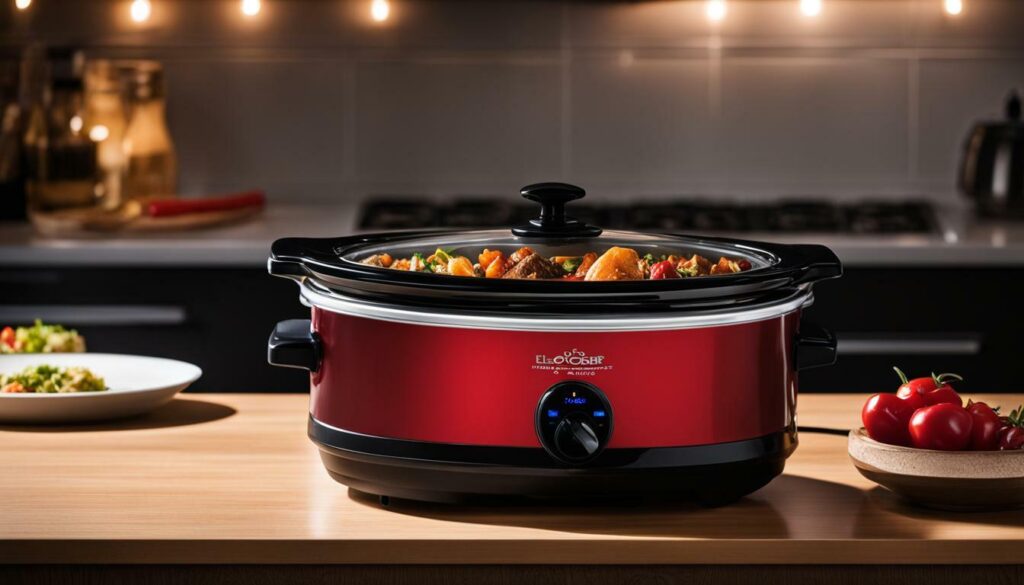
“Slow cookers are a clear winner when it comes to energy-saving cooking methods.”
In summary, slow cookers are a highly energy-efficient and convenient way to prepare meals. Their low and slow cooking method means that food is cooked evenly with minimal energy usage, making them an excellent choice for energy-conscious households. Plus, their convenience and versatility make them a great tool for efficient meal preparation.
Understanding Energy Conservation Benefits
If you are looking to reduce your energy consumption, using a slow cooker is a great way to start. Slow cookers are designed to use minimal energy while cooking food at low temperatures for extended periods. This method of cooking not only saves energy but also results in delicious and healthy meals.
Slow cookers are also beneficial for preventing food waste and reducing your carbon footprint. Because slow cooker meals can be made in large batches, you can store leftovers in the fridge or freezer and avoid throwing away food. Additionally, slow cookers use less energy than traditional cooking methods, which means less energy is required to prepare meals on a regular basis.
By using a slow cooker, you are making a conscious effort towards sustainable cooking practices. The slow cooker’s energy-saving capabilities allow you to reduce your energy consumption, save money on your utility bills, and contribute to a greener environment.
So, whether you are looking to reduce your environmental impact or save money on your energy bills, using a slow cooker is a great way to achieve both. Not only will you enjoy delicious and healthy meals, but you will also be making a positive impact on the planet.
Exploring Slow Cooker Size and Energy Efficiency
When it comes to choosing an energy-efficient slow cooker, size matters. Selecting the appropriate slow cooker for your needs can impact energy consumption and ultimately, save you money on your energy bills.
It’s important to consider the size of your slow cooker in relation to the amount of food you plan to prepare. Choosing a large slow cooker for smaller meals means more energy is being used than necessary. On the other hand, choosing a small slow cooker for larger meals may result in overfilling and longer cooking times, which also uses more energy.
When selecting a slow cooker, look for models that offer various sizes to choose from. This can give you the flexibility to choose the appropriate size for each meal and minimize energy waste.
Additionally, there are other tips for reducing energy consumption when using a slow cooker. For instance, using the low setting instead of the high setting can help save energy while still cooking food thoroughly. Prepping ingredients in advance and using the slow cooker to reheat leftovers can also reduce the amount of energy used in the kitchen.
Overall, choosing the right size slow cooker for your needs and utilizing energy-saving cooking methods can make a significant impact on your energy consumption. By implementing these tips and selecting energy-efficient cooking appliances, like slow cookers, you can work towards a greener lifestyle while also saving money on your energy bills.
Additional Considerations for Energy-Efficient Cooking
While a slow cooker is a great appliance for energy-efficient cooking, there are other options to consider to further reduce energy consumption in the kitchen.
One such option is induction cooking. These stovetops use electromagnetic fields to heat the cookware, making them much more energy-efficient than traditional gas or electric stovetops. Plus, they heat up quickly, allowing for faster cooking times.
Another consideration is using energy-efficient cookware. Look for pots and pans made from materials such as copper or stainless steel, which heat up quickly and evenly. Also, consider using pots and pans that fit the size of your burner or element to prevent excess energy loss.
Cooking with lids on pots and pans is also a simple way to save energy. Trapping the heat inside the cookware helps food cook faster and more evenly, reducing cooking time and energy consumption.
Finally, when using your oven, try to plan ahead and cook multiple dishes at once to make the most of the energy used. And, when preheating your oven, do so only for the recommended amount of time specified in your recipe to avoid wasting energy.
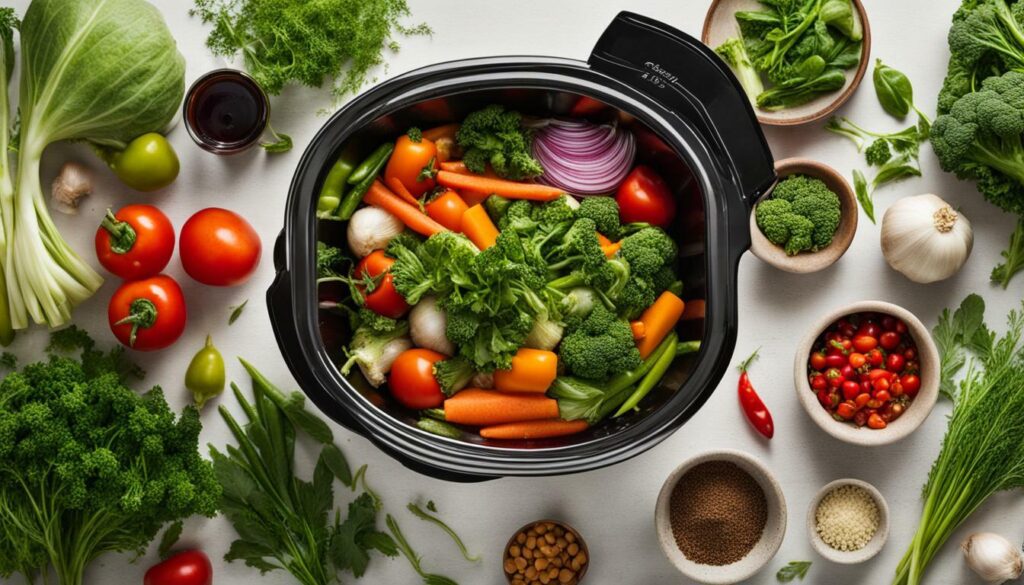
Tip: When shopping for energy-efficient cooking appliances, look for the ENERGY STAR label. This certification indicates that an appliance meets strict energy efficiency standards set by the U.S. Environmental Protection Agency.
By considering these additional options for energy-efficient cooking, you can further reduce your energy consumption and contribute to a more sustainable lifestyle.
Conclusion
Slow cooker energy efficiency is an important consideration for anyone looking to save on their energy bills and contribute to a greener lifestyle. By using energy-efficient slow cookers and implementing sustainable cooking practices, you can reduce your overall energy consumption in the kitchen.
Throughout this article, we have explored the benefits of using energy-efficient slow cookers, how energy efficiency ratings work, and the key features to look for when choosing an eco-friendly option. We have also provided practical tips for maximizing energy efficiency, compared slow cookers to traditional cooking methods, and delved into the energy conservation benefits of using a slow cooker.
It is important to remember that slow cooker size plays a significant role in energy efficiency and selecting the appropriate size for your needs can lead to significant energy savings. Additionally, incorporating other energy-efficient cooking appliances and techniques can complement the use of a slow cooker and further reduce energy consumption.
FAQ
Q: What is the energy efficiency of small slow cookers?
A: Small slow cookers are known for their energy efficiency. They use low wattage compared to other cooking appliances, making them a cost-effective option for slow-cooking meals.
Q: How can energy-efficient slow cookers help save on energy bills?
A: Energy-efficient slow cookers consume less energy during the cooking process, which can help reduce energy bills. Their insulation and sealed lids trap heat inside, allowing for more efficient cooking.
Q: What are energy efficiency ratings for slow cookers?
A: Energy efficiency ratings for slow cookers indicate how well they use energy. Look for slow cookers with higher energy efficiency ratings, as they will consume less electricity while cooking.
Q: What features should I look for in energy-efficient slow cookers?
A: When choosing an energy-efficient slow cooker, look for features such as programmable timers, temperature control settings, and removable stoneware. These features contribute to better energy management and convenience.
Q: How can I maximize energy efficiency while using a slow cooker?
A: Consider preheating the slow cooker before adding ingredients to maximize energy efficiency. Use the right size of slow cooker for your meal and avoid opening the lid during cooking, as this can release heat and increase cooking time.
Q: Are slow cookers more energy-efficient than traditional cooking methods?
A: Slow cookers are generally more energy-efficient than traditional cooking methods. They use a lower wattage and cook at a lower temperature, reducing energy consumption.
Q: How do slow cookers contribute to energy conservation?
A: Slow cookers contribute to energy conservation by using less electricity than other cooking appliances. They also help reduce the need for additional kitchen appliances, such as ovens or stovetops.
Q: Does slow cooker size affect energy efficiency?
A: Slow cooker size can affect energy efficiency. Choosing the right size for your meal can help minimize energy waste, as larger slow cookers may consume more energy than necessary for smaller portions.
Q: Are there other energy-efficient cooking considerations besides using a slow cooker?
A: Yes, there are other considerations for energy-efficient cooking. You can also use energy-efficient appliances like induction cooktops and choose energy-saving cooking methods such as steaming or using pressure cookers.



